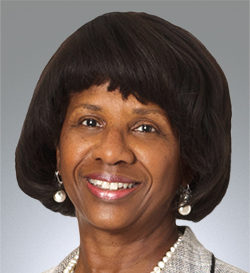5 minutes with... Paulette Brown
 When did you decide to become a lawyer? Why?
When did you decide to become a lawyer? Why?
I decided to become a lawyer when I was in undergraduate school. I went to college knowing that I wanted to make a positive impact on society. I did not think about law, but rather social work. My roommates, as well as several of my professors who were lawyers, persuaded me to go to law school.
Starting out, what did you expect from a career in the law?
I expected to serve the public and obtain justice for the underserved. I learned that there are several ways that can be accomplished. Pro bono activities, for example.
How did you get into the areas of law you are known for today? By design? Chance? Both?
It was both by chance and design.
What do you consider to have been your big break?
I have had many breaks and many people who have provided opportunities to me which I have seized upon. A turning point was probably when I went to my first National Bar Association Convention and met so many successful African American lawyers, working in areas of the law that at the time I had no familiarity with. They were so embracing of me as a new lawyer and as a lawyer new to the NBA, I really started to expand my thinking.
What achievement are you most proud of?
There are a couple of things. The adoption of my son, leading a delegation to monitor the first and free democratic elections in South Africa and forming my Women of Color Mentoring Group.
What do you consider your greatest failure or regret?
Not focusing more on the possibilities at a much younger age and not having an understanding that you must be a participant to effectuate any type of change.
"I would try to persuade law students to think more globally – what areas of law are hot outside of the USA?"
What law would you change, abolish or create?
I have intentionally skipped this question.
Who is your legal hero?
I have multiple legal heroes. If I could choose three, they would be Charles Hamilton Houston [1895 - 1950; former Dean of Howard University Law School and prominent African American lawyer], Gertrude Rush [1880 - 1962; first African American lawyer in Iowa] and Constance Baker Motley [1921 - 2005; African American civil rights activist, lawyer and state senator].
What particular challenges (if any) did/do you face in your legal career as a minority woman, and how did you overcome them? Do you have any particular advice for minority women about to embark on their careers in the law?
There is no short answer to this question. Sometimes, I remain invisible. That is to say, for example, even when I have expertise in a particular area and I am speaking to someone about a presentation, they will not necessarily think to include me. My opinion is that, to me, I am invisible to them. I remind them. I challenge assumptions. I ask the direct question when necessary.
As it relates to young women of color, there are examples. I advise them that their number one job is to become the best lawyers they can be. I advise them not to be side tracked by firm committees (such as diversity) when they are new lawyers. I advise them to get as much exposure to as many people as possible. I advise them to get immediate feedback on their work. I advise them to know what their reputation is (perceived or actual) at all times within their organization.
What career would you have in your second life?
I would be a personal chef.
What slogan would you like to be remembered by?
To whom much is given, much is required.
What advice would you give to students trying to enter the legal profession today? And secondly, to those who hope to ultimately get into the areas of law in which you are expert?
My area of the law is becoming commoditized and while it is extremely interesting, I would try to persuade law students to think more globally – what areas of law are hot outside of the USA? What are the common needs in the USA and abroad?